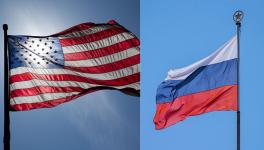Pompeo Coming With American Goodies, But There's a Paradigm Shift
Image for representational use only.Image Courtesy : The Hindu
From an Indian perspective, the much-touted speech by the US Secretary of State Mike Pompeo at the India Ideas Summit and the annual meeting of the US-India Business Council at Washington, DC turned out to be a disappointment, its boastful advertisement notwithstanding.
Nonetheless, it draws attention as a the ‘curtain-raiser’ to his forthcoming visit to New Delhi on June 24. Also, Pompeo’s visit itself happens to be just before the G20 summit meeting (June 28-29) in Osaka, Japan, where Prime Minister Narendra Modi is expected to have a meeting with President Donald Trump.
Clearly, Pompeo’s talks in Delhi will set the tempo for Trump, who is known to have a child-like impressionable mind, highly susceptible to the very last input he receives from advisors.
The scheduling of two such high-level engagements within the week by the Trump administration with Indian leadership so soon after our general election and the government formation corroborates Pompeo’s startling claim in his speech on Wednesday that he and his team in Faggy Bottom were not at all surprised that Modi secured a “huge mandate” and “returned to office by a single-party majority”. Pompeo lavishly praised Modi:
“Many observers were surprised by the result, but, frankly, I wasn’t. I’ve been watching closely. My team at the State Department was watching closely. And we knew – we knew that the prime minister was a new kind of leader for the world’s most populous democracy. He is the son of a tea seller who worked his way up to governing a state for 13 years and now leads one of the world’s truly emerging powers.”
“He’s made economic development for the poorest Indians a priority. And, indeed, millions who once went without light bulbs now have electricity. And millions who lacked cookstoves now have them.”
Quite obviously, Pompeo insists that he subscribes to the official Indian narrative of the alchemy of Modi’s election victory — as a mandate for “economic development for the poorest Indians” — which differs sharply from that of the bulk of the western media, especially the American media, that tended to agree with the Khan Market Gang.
This may be clever diplomacy — stooping to conquer Modi with flattery — but Pompeo apparently blithely overlooked that in the process, he has also provided a benchmark for the India-US partnership. The point is, if Modi and India’s priority lies in economic development and poverty alleviation, what is it that the US can offer to promote our country’s economic transformation?
In his entire speech, the nearest Pompeo comes by way of giving an answer to this poignant question is by offering to sell (at market price) shale gas from the US to substitute for India’s oil imports from Venezuela and Iran (which, by the way, are not allowed under US sanctions) — and, of course, the “state-of-the-art fighters that could give India the capabilities it needs to become a full-fledged security provider throughout the Indo-Pacific.”
He pointed out that if money is the problem that inhibits Modi government from buying more American products, that has been sorted out, too — “We’ve already launched the Asia-EDGE program… to help India raise private capital to meet its energy and security needs for years to come.”
Can anyone be more generous than that as India’s benefactor? Pompeo’s speech is at its weakest on this score. And Delhi is entitled to ask: ‘Tell us something at least about how you can promote our country’s economic transformation.’ Pompeo’s speech becomes a marker displaying how far the India-US relationship has deviated from the foundational thinking behind it in the early 1990s when India’s reforms began accelerating and China’s rise was still lying in the womb of time.
Basically, Pompeo spoke at length, going round and round, on two themes — market access for American companies to step up exports to India and a platter full of weaponry.
So, how does Pompeo’s check list look like? In a broad sense, he is coming here “to make sure that we have economic openness”; to ensure that “we have to deliver”; to understand that “we have to execute” what we promised to do; and, to “broach some tough topics.”
Pompeo lists out some of those “tough topics”. One, Washington and Delhi have to “work out our disagreements” over Trump’s decision on the GSO programme. The US is open to dialogue provided “our friends in India will drop their trade barriers”. Two, the US will “push for free flow of data” not only to help American companies but “to protect data and secure consumers’ privacy. Three, the US is “eager” that Indian establishes “secure communication networks” — read, by banning 5G technology from China’s Huawei.
Pompeo added that the above are “just a few things that sit on the tip of our tongue, at the top of our mind” and there are a few more surprises on his check list. He underscored, “we want to complete the Westinghouse civil nuclear project, and deliver more LNG and crude” so that India “will no longer have to rely on difficult regimes like those in Venezuela and in Iran.” Plus, of course, Pompeo made it clear that he will push for GOI decisions on the sale of Boeing’s F/A-18 and Lockheed Martin’s F-21 aircraft to Indian armed forces.
The Lockheed Martin has set up a joint venture with Tata Group for manufacture of F-21 jets, which are an upgrade of the obsolete F-16 fighters whose production the US has phased out. To pepper the deal, unsurprisingly, Pompeo also alluded to “President Trump’s vision for a Free and Open Indo-Pacific” — codename for containment strategy against China. Pompeo gave a bombastic touch to it, saying “It (strategy) starts from the premise that we (US and India) share a common set of values – the values of democracy and freedom and a core belief in the ingenuity of the human spirit.”
Pompeo knows that early birds catch worms. He places great store on S. Jaishankar’s appointment as the External Affairs Minister. He fondly recalled Jaishankar’s past pledges that “he’s ready to cultivate a warmer relationship with America – and he knows that the feeling is mutual. We want to move ahead.”
Pompeo doesn’t appear to have sought a meeting with National Security Advisor Ajit Doval. Now, that’s a stunning departure from earlier times when Washington used to count on the NSA as ‘our man in Delhi’. There is indeed a paradigm shift. Pompeo is representing American arms vendors and US exporters, but he isn’t wasting time calling on Raksha Mantri or Commerce Minister, either. It’s a brave new world now — where business is optimally transacted at foreign-minister level, one-on-one.
Get the latest reports & analysis with people's perspective on Protests, movements & deep analytical videos, discussions of the current affairs in your Telegram app. Subscribe to NewsClick's Telegram channel & get Real-Time updates on stories, as they get published on our website.























